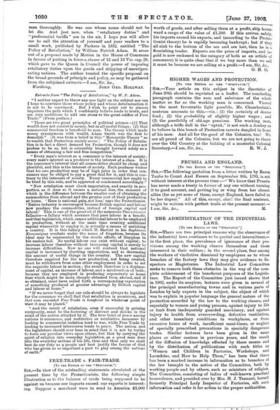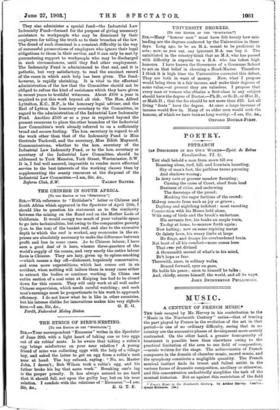THE ADMINISTRATION OF THE INDUSTRIAL LAWS.
[To THE EDITOR OF THE "SPECTATOR."]
Sin,—There are two principal reasons why the observance of the industrial laws continues to be partial and intermittent,— in the first place, the prevalence of ignorance of their pro- visions among the working classes themselves and those interested in their welfare ; in the second place, fear among the workers of vindictive dismissal by employers as to whose breaches of the factory laws they may give evidence to In- spectors or Magistrates. The Industrial Law Committee seeks to remove both these obstacles in the way of the com- plete achievement of the beneficent purposes of the Legisla- ture. The Report of the Committee just issued shows that in 1902, under its auspices, lectures were given in several of the principal manufacturing towns and in various parts of London by lady experts in the subject, the object of which was to explain in popular language the general nature of the protection accorded by the law to the working classes, and especially to women and young persons, against injury to life or limb from inadequately guarded machinery, and against injury to health from overcrowding, defective ventilation, and other insanitary conditions in workplaces, or from excessive hours of work, insufficient meal-times, or neglect of specially prescribed precautions in specially dangerous trades. Similar lectures have been given in the same places or other centres in previous years, and the result of the diffusion of knowledge effected by these means and by the distribution of publications with such titles as " Women and Children in Factories, Workshops, and Laundries, and How to Help Them," has been that there has been a marked increase in information as to breaches of the law brought to the notice of the Committee, both by working people and by others, such as ministers of religion. The Committee, consisting of ladies of well-known practical benevolence, and presided over by Mrs. H. J. Tennant, herself formerly Principal Lady Inspector of Factories, sift such information and refer it for action to the proper authorities.
They also administer a special fund—the Industrial Law Indemnity Fund—formed for the purpose of giving necessary assistance to workpeople who may be dismissed by their employers for telling the truth as to their breaches of the law. The dread of such dismissal is a constant difficulty in the way of successful prosecutions of employers who ignore their legal obligations to those in their service, and it can only be met by guaranteeing support to workpeople who may be discharged in such circumstances, until they find other employment. The Indemnity Fund is administered to that end, and it is pathetic, but very satisfactory, to read the succinct record of the cases in which such help has been given. The fund, however, is rapidly shrinking. It is vital to the effectual administration of the law that the Committee should not be obliged to refuse the kind of assistance which they have given in recent years to truthful witnesses. About £100 a year is required to put this work beyond all risk. The Hon. Alfred Lyttelton, K.C., M.P., is the honorary legal adviser, and the Earl of Lytton the honorary secretary to the Committee, in regard to the administration of the Industrial Law Indemnity Fund. Another £160 or so a year is required beyond the present resources to place the other branches of the Industrial Law Committee's work already referred to on a sufficiently broad and secure footing. The hon. secretary in regard to all the work other than that of the Indemnity Fund is Miss Gertrude Tuck-well, and the secretary, Miss Edith Maynard. Communications, whether to the hon. secretary of the Industrial Law Indemnity Fund, or to the hon. secretary or secretary of the Industrial Law Committee, should be addressed to York Mansion, York Street, Westminster, S.W. It is, I feel well assured, impossible to render more effectual service to the best interests of the working classes than by supplementing the scanty resources at the disposal of the Industrial Law Committee.—I am, Sir, &c.,























































 Previous page
Previous page